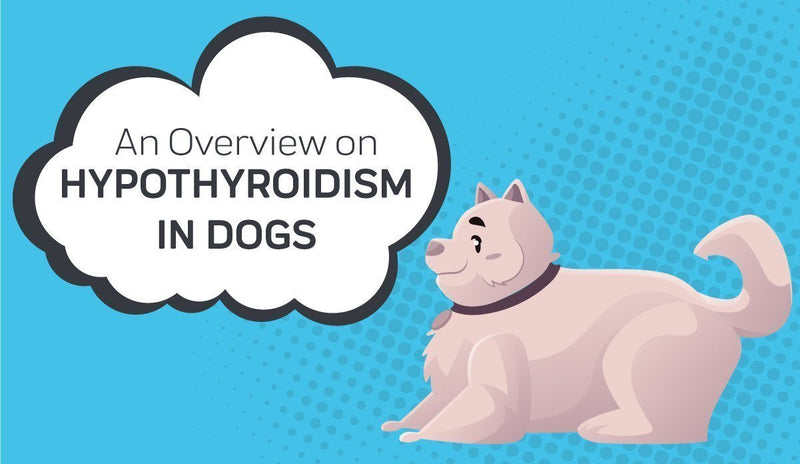- What Function Does the Pancreas Serve?
- What Exactly is Pancreatitis in Dogs?
- Are Certain Dogs Prone To Pancreatitis?
- What Causes Pancreatitis In Dogs?
- What Are Symptoms of Pancreatitis in Dogs?
- How is Pancreatitis Diagnosed?
- What is the Treatment for Dogs with Pancreatitis?
- Treating Pancreatitis with Medication
- Are There Natural Options For Treating Dog Pancreatitis?

Having a dog that isn't feeling well is never fun. It's upsetting for the dog, and it's stressful for pet parents. Pancreatitis is an especially worrisome disease of the pancreas that usually affects older dogs. There are two classes of pancreatitis in dogs: chronic pancreatitis and acute pancreatitis. Each variation has its own individualized course of treatment.
For pet parents that want to understand more, we've created this comprehensive guide to what causes pancreatitis, the clinical signs that pancreatic conditions manifest, and courses of treatment.
What Function Does the Pancreas Serve?
The pancreas of a dog is located in its upper abdominal wall. It is a V-shaped organ near the duodenum. The pancreas contains two ducts and works with the bile duct of the liver. It is an essential part of the canine digestive system, helping dogs to perform at optimum capacity.
The pancreas has both an endocrine function and an exocrine function. The exocrine function of the pancreas is for digestion and allows digestive enzymes into the small intestine. The pancreas assists in breaking down carbs, low fat foods, high fat foods, and other materials that the body processes for energy and function.
Endocrine function within the pancreas is for secreting hormones that are important to biological function. This function can affect mood as well as the overall health of canines. One role endocrine function is responsible for is handling glucose in the body.
What Exactly is Pancreatitis in Dogs?
Pancreatitis in dogs occurs when digestive enzymes are activated within the pancreas before they get to the lower intestine. This causes inflammation of the pancreas. Mild cases can produce clinical signs of pancreatitis such as irritability, diarrhea, and vomiting, leading to acute pancreatitis. In scientific terms we are looking at exocrine pancreatic insufficiency.
Chronic pancreatitis results from severe cases, whose clinical signs may include abdominal pain and acute inflammation of the pancreas. In chronic cases, those digestive enzymes may cause the dog to become very sick, even leading to septic shock. This is a severe situation that requires immediate veterinary care. Dogs with clinical signs such as abdominal pain, loss of appetite, and severe cases of pancreatic inflammation will need more care and treatment.
Are Certain Dogs Prone To Pancreatitis?
Any dog of any age could wind up with a diagnosis of pancreatitis after a routine blood test. However, there are some breeds that are more prone to this condition.
Breeds like spaniels, boxers, collies, mini schnauzers, and schnauzers are more prone to developing acute pancreatitis. Also, dogs that are older are more likely to acquire pancreatic-related conditions than puppies, such as Diabetes Mellitus.
What Causes Pancreatitis In Dogs?
It is not always easy to diagnose the clinical cause of pancreatitis. However, there are risk factors that pancreatitis may result from more easily. A significant risk factor that can be a cause of pancreatitis is obesity. This is due to the condition of hyperlipidemia that is common in obese dogs. Dogs that are of the breeds more likely to get pancreatitis should be monitored closely, especially if they are obese.
Diabetes and Acute Pancreatitis
Dogs that have diabetes are at more severe risk for developing pancreatitis. Unstable fluctuations in blood sugar levels may exacerbate latent pancreatitis in dogs.
Your Dog's Diet and Pancreatitis
Diet is another leading cause of associated pancreatic conditions in dogs. Giving your dog higher quality food, putting them on a low fat diet, and taking them out for exercise more often can cut that risk factor enormously. Even making sure they get more fluid in their diet can help get their weight under control.
Losing body fat can make a big difference in the pancreatic health of your dog. Losing weight can help lower the risk of obesity-related diseases that manifest in the blood, like Diabetes Mellitus. The blood sugar abnormality caused by diabetes can lead to all sorts of abdominal abnormalities, such as vomiting, dehydration, and blood disease, so it's best to track the signs of the condition before it becomes severe pancreatitis.
Switching your dog's high fat diet over to a low fat diet is a perfect place to start.
What Are Symptoms of Pancreatitis in Dogs?

There are many symptoms present in diagnosing pancreatitis. A veterinarian can spot the condition earlier through blood, pancreatic tissue, and behavior tests, but you can start watching for the warning signs early.
Most dogs may have one, some, or all of the symptoms that are listed below:
- Mild to severe diarrhea
- Vomiting
- Loss of appetite
- Dehydration
- Pain in the abdomen
- Fever
- Acute lethargy
- Excessive licking of their lips
- Jaundice
If your pet has some of these symptoms, it would be prudent to get them checked out by your trusted vet. Dogs may develop anorexia or anorectic behaviors if they have pancreatitis. They will suddenly lose most or all interest in food, or they may suddenly begin regurgitating their food.
How is Pancreatitis Diagnosed?

Ultimately, it is up to a veterinarian to diagnose pancreatitis in dogs. Most veterinarians will look for indications of acute pancreatitis in blood tests as a first step. If the blood test looks normal, they may order an ultrasound or a radiography test to look at your dog's internal organs.
Beyond an ultrasound, the vet may want to perform a medical biopsy or remove a small portion of pancreatic tissue. Analyzing this tissue with a microscope will turn up any abnormalities that were hidden in the blood. This can give a more definitive medical diagnosis of what is wrong.
The diagnosis for pancreatitis conditions used to rely on testing for high enzyme levels for serum lipase and serum amylase. Canine pancreatic lipase only increases when there is inflammation in the pancreas, and if there's pancreatic inflammation, there's a chance of pancreatitis.
It is vital to try and remain calm throughout this process. Pets can sense when their pet parents are anxious or worried, and vets can sense when their patients are abnormally stressed. Overly stressed patients make it harder for vets to administer a clinical test of an organ like the pancreas, such as an ultrasound.
What is the Treatment for Dogs with Pancreatitis?
Canine pancreatitis can be treated. The options for treatment of chronic and acute pancreatitis will be based on the health of your dog, the severity of the disease, and what the veterinarian thinks will be best for your dog.
Treating Chronic Pancreatitis with Intravenous Treatment
Many veterinarians choose to treat their patients with a therapeutic dose of intravenous fluids. There is a particular intravenous fluids treatment that will help to restore health in your pet's body in a way that is necessary for recovery from severe dehydration and maintain normal fluid levels. In some cases, the vet may prescribe anti-emetic medications. This is to prevent vomiting, nausea, and other associated abdominal issues.
Diet Management to Treat Pancreatitis
Decreasing high fat foods and overall diet change factor into most treatment plans. Your veterinarian can guide you toward certain brands or types of low fat food that will be good for the small intestine of your furry friend.
Treating Pancreatitis with Medication
Your veterinarian may prescribe medicines for the treatment of pancreatitis in dogs. A prescription will be given if the vet feels that it will benefit your dog's health. It depends on the severity, but the pain of pancreatitis can be greatly relieved by medication. Request a veterinary consultation if you have any questions about the prescribed course of treatment, whether pills, intravenous fluid infusion, or otherwise.
Knowledge is power. Here at Innovet Pet, we encourage dog owners to be as informed as possible. Most vets will answer your questions freely and give you the answers that you need and want.
What is Famotidine?
Famotidine helps with excessive acid production in the stomach. Dogs that have pancreatitis may benefit from this. It is also a treatment for pets that have certain gastrointestinal diseases. Dogs with pancreatitis can take Famotidine. The Famotidine dog dosage will depend on their size and weight. The recommended dosage is between .25 and .5 mg of the medication for every pound of body weight.
It would be best to consult with a veterinary expert about what dosage of Famotidine they normally recommend for their patients. It can be purchased at an over-the-counter store without a clinical prescription.
What Is Metronidazole?
Metronidazole is an antibiotic medication not often prescribed after a test reveals a pancreatitis prognosis. Metronidazole is given for certain infections and should only be provided under the advisement of a veterinarian or associated medical expert for pancreatitis in dogs.
In any case, it is vital to listen to the advice of your trusted vet. Keep an eye on your dog whenever you are giving them new medication. Some medications may not agree with your dog, so look out for any adverse side effects.
Are There Natural Options For Treating Dog Pancreatitis?
Parents of dogs are becoming more and more aware of what they put in their dog's bodies. Giving your dog a lot of chemicals and medications can be hard to stomach, literally. Most medications and chemicals come with a laundry list of unpleasant side effects. Some side effects are even worse than what the medication is supposed to treat.
One amazing natural option for mild to severe pancreatic pain is CBD Oil for dogs. CBD has recently become more popular and recognized as an all-natural alternative to the management of a variety of ailments. There are studies that show the efficacy and safety of THC-free CBD. It can help animals as much as it helps people that have health issues. It can aid the management of inflammation, chronic pain, vomiting, dehydration, epilepsy, and cancer.
Will They Remove My Dog's Pancreas?
Only a small number of cases of pancreatic disease will necessitate surgery. The body cannot regulate glucose without the pancreas. Your pet's quality of life would be drastically reduced, and it would be difficult for them to survive long-term.
In the case of acute pancreatitis, removal will almost never be required. Some dogs with chronic pancreatitis, however, may require partial removal. This is a fairly common surgery that licensed veterinarians perform on their patients all the time.
Total removal of the pancreas will not happen. Partial removal of the pancreas is sometimes done if the chronic pancreatitis is severe in critically ill patients that the vet feels it would be their best chance. The good news is that most canines with acute pancreatitis will simply need their pancreatitis treated and don't require surgery.
With the right treatment, your dog will begin to improve, showing fewer and fewer clinical signs of pancreatitis. Working with your trusted vet and following their guidelines and instructions will make a huge difference in how well your furry friend does.
What Is The Prognosis for Canine Pancreatitis?
Pancreatic conditions can range from acute pancreatitis to chronic pancreatitis. Chronic pancreatitis means that it will be an ongoing condition that must be treated on a long-term basis. Acute pancreatitis is often a short-term disease that will not become chronic.
The prognosis will depend on their overall health, age, and the type of pancreatitis they are diagnosed with. This is a discussion you will have with your vet. The best thing that you can do for them is to stay optimistic and supportive. Treatment will give you more time with your dog whereas not treating or waiting to treat too long can end up with multiple organ failure in your beloved pet. Please visit your vet as soon as you notice the signs so you can help your dog.
Pancreatitis In Dogs: Final Thoughts
A diagnosis of pancreatitis in dogs can be difficult to hear. It is a lot of work to take care of an animal that is healthy, but it is much more work to take care of one that is sick.
Parents whose dogs show signs of pancreatitis should try and be optimistic. Many pets with this disease can get better and see improvements. Even those with chronic pancreatic conditions can learn management techniques to live a full and happy life. Making sure to work with a vet will always be essential in helping dogs with pancreatitis live their best possible lives.
Sources:
Diagnosing canine pancreatitis
Approved by:
Dr. Ivana Vukasinovic
Doctor of Veterinary Medicine, University of Belgrade
 Ivana Vukasinovic grew up in Serbia and attended the University of Belgrade where she received a degree in Veterinary medicine in 2012 and later completed surgical residency working mostly with livestock. Her first year of practice was split between busy small animal practice and emergency clinic, and after two more years of treating many different species of animals, she opened her own veterinary pharmacy where an interest in canine and feline nutrition emerged with an accent on fighting animal obesity. In her free time, she acts as a foster parent for stray animals before their adoption, likes to read SF books and making salted caramel cookies.
Ivana Vukasinovic grew up in Serbia and attended the University of Belgrade where she received a degree in Veterinary medicine in 2012 and later completed surgical residency working mostly with livestock. Her first year of practice was split between busy small animal practice and emergency clinic, and after two more years of treating many different species of animals, she opened her own veterinary pharmacy where an interest in canine and feline nutrition emerged with an accent on fighting animal obesity. In her free time, she acts as a foster parent for stray animals before their adoption, likes to read SF books and making salted caramel cookies.
Thanks for stopping by!
P.S. We Love You!
Sincerely,
The Innovet Team
Please do not ask for emergency or specific medical questions about your pets in the comments. Innovet Pet Products is unable to provide you with specific medical advice or counseling. A detailed physical exam, patient history, and an established veterinarian are required to provide specific medical advice. If you are worried that your pet requires emergency attention or if you have specific medical questions related to your pet’s current or chronic health conditions, please contact or visit your local/preferred veterinarian, an animal-specific poison control hotline, or your local emergency veterinary care center.
Please share your experiences and stories, your opinions and feedback about this blog, or what you've learned that you'd like to share with others.
















